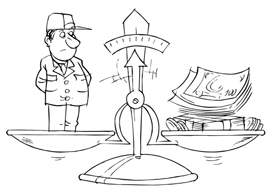
November 01, 2014

Source: Shutterstock
But why did the productivity of the lowest paid in the two companies cited rise? Perhaps it was because they were able to buy better food and therefore they were more energetic, or for some other such reason. But surely two things are obvious: The first is that the effect might not last, as memory of the lower wages faded and any gratitude for the rise likewise; and the second is that, now earning a better wage than workers doing equivalent work for less well-paying companies, the workers in the two companies were anxious to keep their jobs with their more generous employers. If, however, all the other companies raised their wages to the same level, this incentive to greater effort would be lost. All that would have happened is that the general level of wages would have risen, whose overall economic effect might be good or bad. If it rose too high, it might, for example, increase unemployment; the rise would then be good for people who retained their jobs but bad for the unemployed.
It seemed to me that there could hardly have been a better example of “one convulsive act of renunciation,” to quote the book review, by which “you [think you] can escape the complexity that blights your lives” than the policy advocated in the article, which at one fell swoop solved the problem of low productivity in Britain.
One of the advantages of such simple solutions is that it enables their proponents to avoid difficult, embarrassing, and threatening questions such as the following: Why, at times of high unemployment, has Britain found it necessary to import (in very similar numbers to the excess of native unemployed) foreigners to do unskilled labor? No doubt a certain amount of black-market labor at below the legal minimum wage went on, but that is not by any means the whole of the explanation, nor even a major part of it.
I have set many intelligent British people the following problem. Imagine you are an employer who needs an employee to deal directly with the public in a job that requires no special skill. You have two applicants for the job, both 23, one British and one Polish. That is all you know about them. Which do you take?
Everyone, without exception, replies, “the Pole, of course.”
Now there is something upon which the Observer, let alone a British politician, will never reflect.